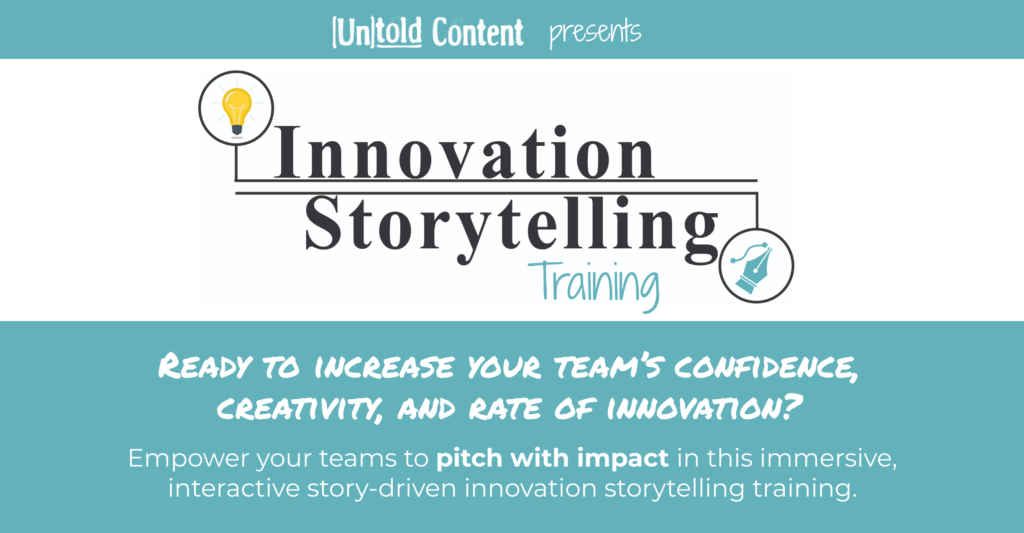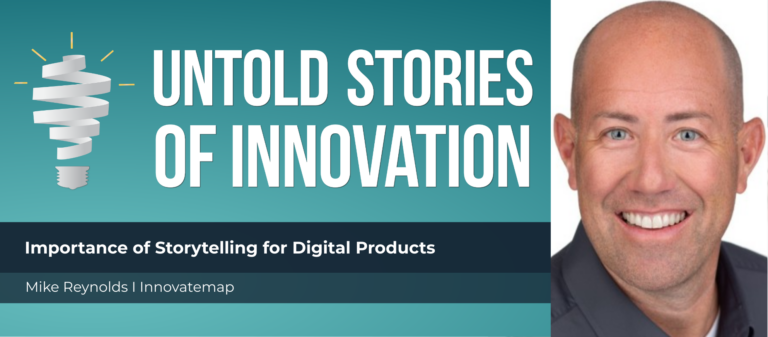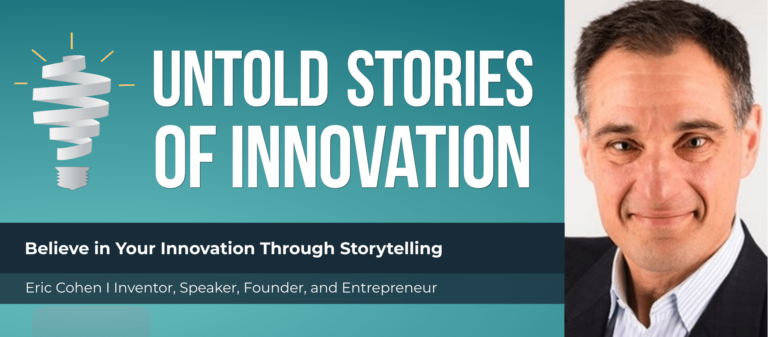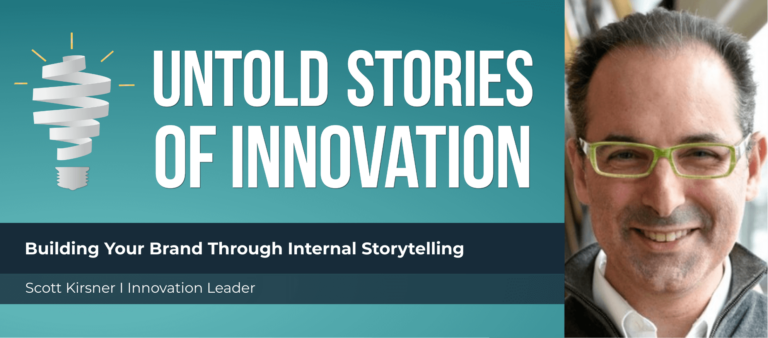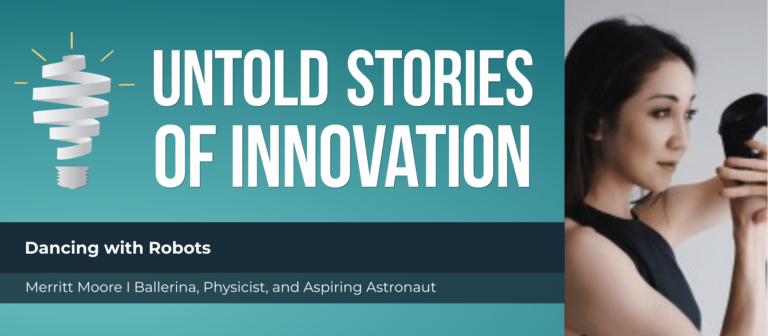Elevating Female Founders with Alicia Robb of Next Wave Impact
Elevating Female Founders - Untold Stories of Innovation
“The commonality of the really great pitches that we see: those that actually are able to tell a personal story.” -Alicia Robb, founder and CEO of Next Wave Impact
From today’s episode you’ll learn
Why do stories matter to the innovation process? What values can be instilled in innovators who share stories? How do innovation leaders inspire creators to tell and share their success and failure stories?
Alicia Robb is founder and CEO of Next Wave Impact, which is a movement driving impact, diversity, and inclusion in early stage investing. Their global fund is building a portfolio of investments in early-stage impact companies with 99 women investors led by an experienced investment committee of ten women. In Alicia’s most recent book about entrepreneurial finance—The Next Wave Impact: Financing Women’s Growth-Oriented Firms published by Stanford University Press—it struck her that only 2.8 percent of women-led companies receive VC capital. And that number is only more staggeringly low for women of color. She works with Next Wave Impact to disrupt the traditional VC structure—empowering more women and people of color to invest, so that minority founders are better represented in the entrepreneurial ecosystem.
Check out Alicia’s book The Next Wave Impact: Financing Women’s Growth-Oriented Firms.
Read more on Stealth research: Lack of peer‐reviewed evidence from healthcare unicorns.
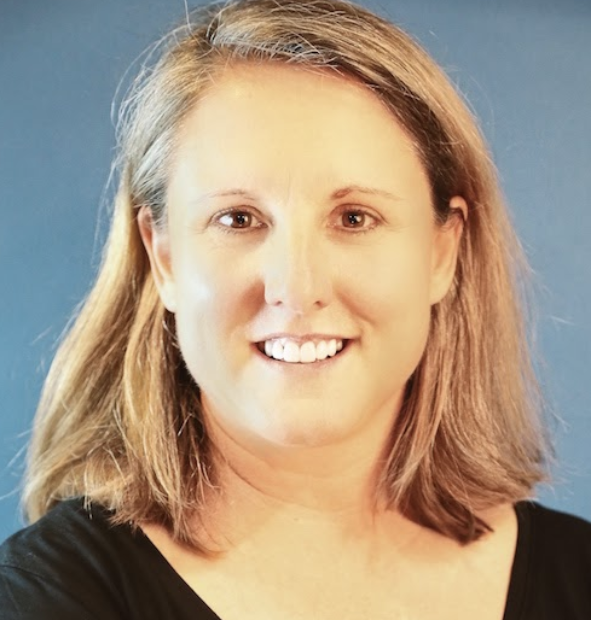
Alicia is the Founder and CEO of Next Wave Impact, the Managing Partner of the Next Wave US Impact Fund, and a Managing Partner of the Rising Tide US Pilot Fund. She was previously a Senior Fellow with the Kauffman Foundation for more than a decade. Alicia received her M.S. and Ph.D. in Economics from the University of North Carolina at Chapel Hill. She previously worked as an economist with the Federal Reserve Board of Governors and the Office of Economic Research in the SBA. She is a prolific author on the topics of entrepreneurship and entrepreneurial finance. In addition to numerous journal articles and book chapters, she is the co-author of A Rising Tide: Financing Strategies for Women-Owned Businesses and The Next Wave: Financing and Investing Strategies for Growth-Oriented Women Entrepreneurs published by Stanford University Press, as well as Race and Entrepreneurial Success published by MIT Press. She teaches workshops on angel investing and investor readiness around the globe. She is an active angel investor, a limited partner in three early-stage venture funds, a mentor to various young firms, and an advisory board member for several nonprofit groups, including the Deming Center Venture Fund, the Good Food Institute, Vegan Investors, and Women Funders in AR.
untoldcontent.com/trainings/innovation-storytelling-training
TRANSCRIPT – Elevating Female Founders
This episode, Elevating Female Founders is powered by Untold Content’s innovation storytelling training. Increase buy in for your best ideas in this immersive and interactive, story-driven experience. Where your teams refine storytelling techniques for their latest projects, prototypes and pitches—and get inspired by 25 epic examples of impactful innovation stories. Learn more at https://untoldcontent.com/innovationstorytellingtraining-2/.
Katie [00:00:00] Our guest today is Alicia Robb. She’s founder and CEO of Next Wave Impact, which is a movement driving impact, diversity and inclusion in early stage investing in the entrepreneurial ecosystem. Alicia is also previously a senior fellow with the Kauffman Foundation for more than a decade. She has her PhD in economics from UNC Chapel Hill, and she’s the coauthor of three books, A Rising Tide: Financial Strategies for Women Owned Businesses, The Next Wave: Financing and Investing Strategies for Growth Oriented Women Entrepreneurs and Race and Entrepreneurial Success. It is such an honor to have you on the podcast today.
Alicia [00:00:36] Thanks so much for having me.
Katie [00:00:38] I had the honor of hearing you speak at the Flywheel Social Enterprise Demo Day this year. Tell me a little bit about your personal story of innovation and where it began. What got you into this community?
Alicia [00:00:56] Yes, it is not a normal route into venture capital, but I was, as you mentioned. I have a PhD in economics. So as an economist, by training, I actually started in the field of microfinance in Central America looking at women, micro entrepreneurs, and how to get them capital to expand their businesses. Somehow that led me into the SBA, where I was funded to do research on small business financing in the United States. And then I ended up doing my dissertation on race, gender and discrimination and entrepreneurial success.
Katie [00:01:31] Wow.
Alicia [00:01:31] And that led me to being recruited by the Federal Reserve Board and the Greenspan days where I did research on small business financing, access to capital, gender and racial gaps in entrepreneurship and entrepreneurial finance. And that led me to the Kauffman Foundation, where I spent 12 years doing research and policy around these, you know, similar racial and gender gaps in high-growth entrepreneurship, which led me to doing research in that gender and racial gaps in the investor side of the equation, which is actually—they’re even—the gaps are even larger. So as part of that last book you mentioned, Next Wave Impact, I researched why we don’t see more women in early stage investing. We know that women get about 3 percent of the venture capital.
Katie [00:02:16] Women founders?
Alicia [00:02:17] Women founders. And one of the reasons why is because most of the investors are white men and they like to invest in other white men. And I thought one way to get more capital to women and people of color was to get more women and people of color on the investing side of the equation. So that’s how thinking about how to design a more innovative way to bring people across the barriers that stop them from being early stage investors. And I ran a pilot fund when I was still at the Kauffman Foundation, trying to really mobilize women to become early stage investors. And that’s how I ended up founding Next Wave Impact. I decided I didn’t want to just do early stage investing. I wanted to invest in early stage impact companies, companies that were for-profit, but also having a social impact. And so I’m running an impact fund now with 99 women, 25 women of color, and we’re investing in impact companies from around the country.
Katie [00:03:17] It’s incredible. How many companies is Next Wave investing in currently?
Alicia [00:03:22] Yeah, our current fund is invested in 13 companies. One is in Cincinnati, Connexus.
Katie [00:03:28] Connexus, yeah.
Alicia [00:03:28] Which is Rod Robinson. He’s our one male entrepreneur. We have 13 companies and twelve of them are women led. But Rod’s company is looking at supply chain diversity and so very much impacting women and people of color.
Katie [00:03:41] Yes.
Alicia [00:03:42] So we’re really excited to have Connexus in our portfolio.
Katie [00:03:45] Can you tell me a little bit more about how the research you did in the earlier days of your career led you to the findings that you needed in order to design a program like the pilot that you built inside of Kauffman, which eventually became Next Wave? What were those findings that you uncovered around why it’s important to build into the venture capital side of the table and not only support more female founders?
Alicia [00:04:14] Sure. So really, the first part of the research was really just looking at the data and documenting what the situation was. So looking at, you know, the percentage of entrepreneurs that are women, percentage of companies that are led by people of color, looking at the industry distributions by these owner demographics and seeing where these companies were located and really looking at the financing patterns and credit market experiences of these companies, really realizing the differences in access to capital and the differences in financing patterns by these different groups. So that really led me to looking at this VC number that’s so stark, you know, 2.8 percent of women-led companies receive VC capital. About 1 percent of African Americans, 1 percent of Latino entrepreneurs receive venture capital. If you look at Latinas and women that are African American, I mean, they’re tiny, tiny, tiny percentages. So looking at that and researching why this whole thing around homophily came up, you know, we like to hang out with people that look like us. We like to start companies with people that look like us. We like to invest in companies by founders that look like us. So one of the main reasons why we see most of the venture capital going to white, male-led companies is because most of the investors are white males. So one of the ways to build a pipeline of capital and investors going to women and people of color is to increase the diversity of those investors. So by then thinking, okay, how do we get more investors? The research I did really looked into why we don’t see more women and people of color investing in this asset class. And the research showed a lot of people had never even heard of it. Like, what is angel investing? What is an early stage deal? So part of it was just not being aware of this asset class and the fact that there are angel investors that do this kind of thing. Another reason was it didn’t know other angels. Another was they didn’t see deal flow. So they didn’t see that there were companies they could possibly invest in. Another reason was they didn’t know how. And then I think the other reason was they were risk averse to making that one—that first investment into a high-risk company. So I designed a learning by doing fund that overcame all of those barriers. We designed a learning by doing fund where it had a low minimum. So most venture capital funds, you have to invest at least $250000 to get in.
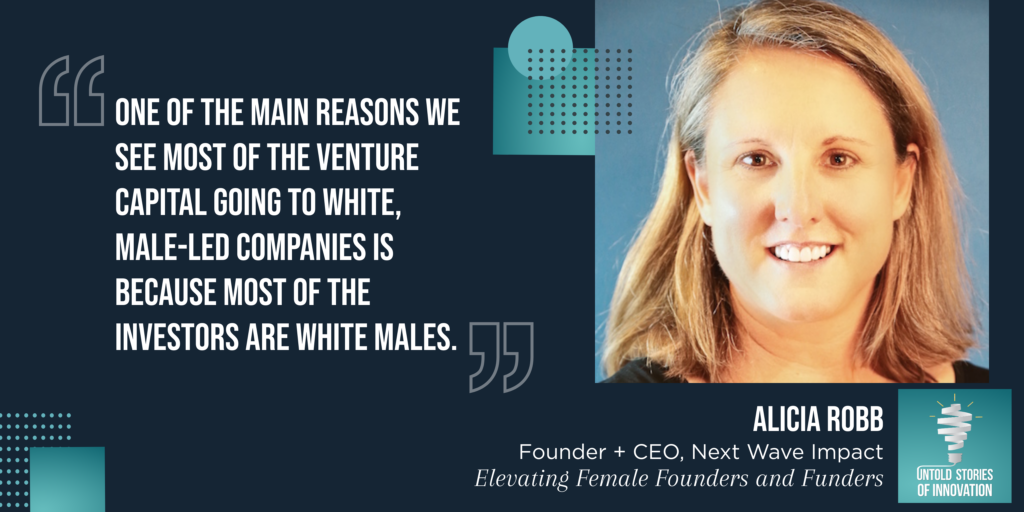
Katie [00:06:50] Sure.
Alicia [00:06:50] We said, all right, let’s have everyone invest $10000. We’ll put together ninety-nine women because that was the SCC limit for the number of investors into a fund. And we had a million-dollar microphone with ninety-nine women and this fund was led by an investment committee of experienced angels. They would mentor the new and emerging angels. We would provide education and training. And that $10000 investment wouldn’t go to just one company, it would be diversified across a portfolio of companies. So here we are getting across all of those barriers, you know—assist, you know, learning by doing education and training, mentoring, diversification, get to hang out with a community of really cool women. And I pitched it to Kauffman and they said, that’s a great idea, but it’ll take us like five years to get through the lawyers, just go do it and we’ll fund the education and training piece. And so I did. And I launched the pilot. We did it. And then we did it simultaneously in Europe. So we had nearly 200 women from 25 states and 25 countries doing these two pilots. When we finished that, looking back—you know, what worked well, what didn’t? We decided that we would do a—that learning from that—so my own learning by doing. I decided I really wanted to focus on impact. Companies that not only were for-profit and scalable, but actually companies that were solving real challenges that our world is facing right now. So I launched Next Wave Impact Fund in 2017 with a similar model—99 women—but I was very intentional about bringing more women of color. So 25 of them are women of color. And then we’re building this portfolio of very diverse entrepreneurs. And as our investments.
Katie [00:08:31] The work is incredible. The learning by doing model fascinates me, and I want to know more about the role that storytelling and story sharing—sharing, successes, fears, failures. What sorts of stories do you hear circulating between mentors and mentees to help sort of guide their pass and increase their confidence? Because it seems like such a barrier to, you know—besides not knowing how, there’s that risk aversion, in fact, which sort of comes from fear of failure or fear of not knowing. So how do you sort of see story sharing happening inside of those relationships?
Alicia [00:09:08] Hmm, that’s an interesting question. So one of the things I’ve often got push back on—why 99 women? Why not let some men in? And one of the things I found was women actually feel more comfortable sharing their stories, sharing their fears, sharing questions that they might not ask in a room of strangers that they would be willing to do with a group of women. And so I really feel like that comfort level was really important. I mean, we encourage women to not just be in our silo of our amazing group and to get out into the, you know, the real world and everything that—and be represented in everywhere else as well. But I think that ability to have a community of a collaborative group that’s really supportive is a way that just opens up people’s willingness to share their fears and share their stories. And I think it’s the same way with the entrepreneurs. So many of these women that are entrepreneurs, they’ve been pitching to white men for the last, you know, however long. And it’s so refreshing. We hear again and again how refreshing it is to pitch, to present our company to someone who actually gets it—for someone who’s not going to ask me, you know, what happens if you get pregnant or how are you going to balance your children with your company and how are you going to do a scalable—what does your husband think? You know, things like you can’t imagine these questions still get asked. And they do.
Katie [00:10:42] They do. I’ve heard it from so many female founder friends.
Alicia [00:10:46] Yes. And so it’s wonderful to be a community that these women feel comfortable telling their stories in a way that they know that we’re not judging them like they might feel judged by white men.
Katie [00:11:02] I am so fascinated by how inclusion can happen by virtue of sort of being able to change the way that communication occurs. So how does a woman of color founder pitch differently to a woman of color investor? Versus an investor with another identity? Have you heard certain—I mean, you already sort of spoke to this, but I want to dig down even more. Are there certain strategies that they can? It sounds like some of the doubts and the risks, too, from a male investor, typically a white male investor’s perspective, can really be limiting or are sort of judgmental of character of capacity and less about, you know, sort of the confidence in the woman, the founder. So it sounds like that’s one area where having another woman to be pitching to that that part is lessened. And perhaps we’re actually talking about the opportunity in the business more so than the capability of the talent.
Alicia [00:12:18] I think I’ve actually seen that. I mean, I’m in an angel group where I’m often the only woman in the room. And so when I see women pitch there, there does seem to be a different dynamic. The other thing we do differently is we do virtual presentations since we have investors all over the country, we do it by Zoom. And so they present from their home or office in a video set setting. And so they’re not coming in and standing up with a bunch of people looking at them, you know, seated around them and they’re presenting. So it’s a whole different dynamic there as well. But I do feel like—they’ve, you know, obviously commented, you know, when they do present to us how—what a different experience it is. I mean, there’s a lot of research now that shows, you know, both women and men, male investors ask different questions of male entrepreneurs than female entrepreneurs. I don’t have the counterfactual because we only really look at women and people of color in presentations. So I don’t know what questions we would ask white men. But certainly in the research, it shows men are asked more opportunity type of questions for promotion. And women are asked more preventative questions. And there’s, you know, now research that shows how you can train yourself to answer a preventative question with a promotional answer to kind of flip it. And so you don’t kind of get sucked into always asking prevention questions with prevention answers. But you actually switch it out since there is this unconscious bias of both women and men to ask these questions. We—a bunch of us women—we had gone to San Diego for a training on unconscious bias. And it really was fascinating. I don’t know for just how we are wired, but really, I did see myself asking questions that were preventative type of questions rather than promotional ones and really training yourself to ask in a way that really allows them to project in the positive growth way and not be defensive.
Katie [00:14:24] Some of your research also looks at how likely a female founder is to even ask for funds in the first place, to get to that point of pitch and that they’re far less likely to ask for venture funds. Can you speak to that research and some of those findings? What you think about that, how that’s informed some of the programs at Next Wave.
Alicia [00:14:46] So this is actually, both on the debt side and the equity side. So if you look at credit market experiences, women are much more likely to not apply for a loan because they fear they’ll be turned down even though they don’t have differences in approval rates. So they think—they’re fearing they’ll be turned down. But in reality, they have very similar approval rates for bank lending.
Katie [00:15:11] Based on like credit score or?
Alicia [00:15:13] Controlling for all of that, they have the similar types of approval rates. Correct. So for venture capital. Yes, I do think women are seeking it less because venture capital is structured in a way that necessitates a company’s growth past. To be this hockey stick growth where they have to sell their company or go public in order to get a liquidity event to get their investors their returns. And a lot of women and people of color are starting businesses so they can grow and scale and build a big business and not sell it. And so part of the reason why there are fewer women going out for venture capital is that financial structure isn’t really what they want. And so one of the things that we’re trying to do is really rethink the VC model and think about how we can better design financial structures of investment products that work for both the entrepreneur and the investor in the sense of getting the investors a return in a timely manner, but allowing the companies to actually keep their company. So what are you coming up with? Well, one of the things we’re gonna do with our next fund is do more investments in a flex equity model. So investing, getting equity, but actually having a plan and a path in place for entrepreneurs to buy back their company after five years. So buy back that part of the equity.
Katie [00:16:46] Interesting.
Alicia [00:16:47] Over five years. There are some other structures that people are playing around with, with like revenue-based financing and so forth. But we’ve got to get creative. We’ve got to think outside of the box. The median VC returns are basically zero. And so it’s not like venture capital is working for many. And there’s, you know, there should be better ways to do this. So as we think about alternative structures and different models, we want to really find things that work for both the entrepreneurs, especially women and people of color, as well as offer investors a return in terms of approval rates. You know, it’s funny about women and men. And one difference that we’ve seen and I saw anecdotally in the research I was doing with the book was Men will go in with a, you know, idea written on a napkin and ask for a million dollars. Women will be like five years in with a profitable record and be like, can I, you know, like really timid. And so I think part of it is really getting more confidence in the women that they have these great business opportunities. Another thing we see is that when women get—they hear no. they take it personally, more personally, and they stop asking. And we have to educate the women entrepreneurs that men are hearing ninety-nine no’s before they hear a yes, if they hear a yes. Don’t take this personally. You have to find the right investor fit. Take the feedback that these investors are giving you, in terms of what is an investable, scalable company. But just because they’re saying no doesn’t mean that this isn’t something that should be pursued. So really incorporate the feedback that they’re offering to make your company presentation a better investment possibility. But I do think part of the reason is women stop asking after they hear no after too many times.
Katie [00:18:43] So persistence is critical.
Alicia [00:18:45] Persistence is very critical.
Katie [00:18:46] Adapt to feedback. Continue to go and go and go.
Alicia [00:18:50] [00:18:50]And we are actually better investments. I mean, we’re so scrappy and we’re so resilient that actually women make better investments. And I think as we get more evidence that shows the superior returns of investing in this under-represented group of entrepreneurs, we’re going to see more and more white males going in because it’s not just the right thing to do, it’s the smart thing to do. [20.2s] It makes business sense, just like I think here in Ohio that there’s so many overlooked entrepreneurs here. Most of the venture capital goes to California, New York and Boston. Well, there’s great ideas and companies everywhere. So our fund specifically looks for companies outside of those three states and looks for companies that are in these overlooked areas, because, again, it’s not just the right thing to do, it’s the smart thing to do.
Katie [00:19:37] I couldn’t agree more. How many pitches do you hear in a year?
Alicia [00:19:43] Oh, a year?
Katie [00:19:43] How about a month?
Alicia [00:19:47] Yeah, I would probably. I hear dozens. Yeah, yeah, dozens.
Katie [00:19:51] So you probably have some advice about some keys to success. First of all, I want to know before we dove into advice, how much time do founders typically get to pitch to you or your team or your angels?
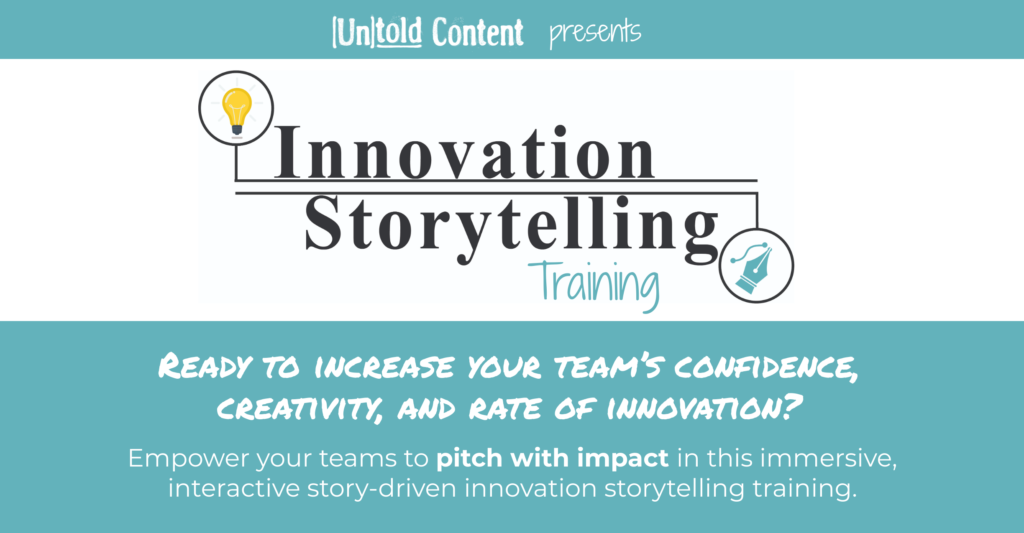
Alicia [00:20:06] Once they’re selected to present to us, they get about 10 to 15 minutes. Often when you’re just running into folks and hearing them on the fly, it can be as little as two to five minutes or so. But once you’re selected by our fund to actually present, then you get about 15 minutes. But I think what’s really important is—you know you’re talking about storytelling—especially for technical founders, it can be really challenging for them, too. They have such passion for what they’re doing. And it doesn’t always translate into a story that we as investors who are not technical understand. [00:20:46]So that’s where it’s really important to tell a story in a way that is understandable by us. But shows your passion and commitment for the why of beginning this company in the first place. [12.0s]
Katie [00:20:59] So definitely passion. If that’s not there, is it just you can have the best idea in the world but if passion doesn’t resonate through?
Alicia [00:21:07] Then we see dozens of pitches every month and you’re just not going to make the cut.
Katie [00:21:11] Mm hmm.
Alicia [00:21:12] Yeah. I mean, entrepreneurship is a hard road. Everyone talks about how everyone wants to be an entrepreneur. Everyone doesn’t want to be an entrepreneur. Like 10 percent of the population are self-employed. Everyone else wants to work in a company, have a stability, you know, salary, employment, you know, health insurance and so forth. It’s not for everyone. And I think if you don’t have that passion and that commitment to seeing that through, then you’re not going to be successful. And we can see that.
Katie [00:21:43] Yeah. And the second factor you mentioned was really understandability. So especially in technical fields—and most of the top innovation industries at this point in terms of the ones that are highest growing, it is highly technical, everything from cybersecurity to A.I. to, you know, incredible progress in automation. So trying to translate sometimes things that are invisible or even scientific too. So chemical manufacturing and processing and agriculture there’s a lot of invisibility to what happens in digital worlds. How—can you give some examples of pitches where the tech founder did a really good job of bringing something highly complex to life and making it understandable and accessible to the investors?
Alicia [00:22:37] Yes, it’s going to be a bat. It’s going to be a—not a great ending story because the company ended up failing, but it was a cybersecurity firm and they were so passionate and made it so understandable. I, as a non-technical investor, really felt the passion and knew that they knew what they were doing—so I was not investing with an angel group at the time. It was just me. So I didn’t have the technical expertise actually to do the, you know, the level of due deal diligence that I could have done with the angel group or a fund. So I bought into the passion and so forth, because it was a compelling story and there is a huge need. I mean, cybersecurity is addressing one of the most, you know, biggest challenges that we’re facing right now. Unfortunately, it didn’t go well and they failed.
Katie [00:23:23] You know, well, you know, we’re living in a post-feminist world. You are not the only investor to have fallen into that trap. And I think.
Alicia [00:23:32] Okay, wait, so Theranos. Let’s talk about that.
Katie [00:23:34] Okay.
Alicia [00:23:35] There were no technical investors that knew anything about that industry that invested in that company. Those were all non-
Katie [00:23:42] There were hardly any publications, peer reviewed publications, yeah. None of the board members were academically affiliated or had research backgrounds. It was kind of incredible. But there was a great article that came out last year and I’ll link it in the show notes. And it was all—it was a study essentially of health care unicorns and how often they’re publishing. And the numbers were abysmal. So it’s starting to rise. The number of health care, you know, billion dollar or more venture-backed healthcare or health tech startups. But it’s the number of publications and the validation of their research and their findings is still ridiculously small and low. So what—that publication sort of came out right after the Theranos debacle happened and that company folded in a big dramatic way. And we’re starting to see, I think, a larger expectation that startups should be getting validation for their findings, that they should have technical members on their board, that that’s a necessity. But it’s still not the majority. What are your thoughts on that?
[00:24:55] Well, Theranos is such an interesting story, because years ago I met a competitor in California. And she, also a female founder, had a similar type of product. And they were an earlier stage in raising capital. And I asked her about Theranos because they at that point raised I don’t know how many hundreds of millions of dollars. And she said to me, she’s like, I’m not convinced that that works. Something’s not right about that. And I thought to myself, my God, what do you know? You’re early stage. You haven’t raised hardly any money. And this woman has raised, you know, hundreds of millions of dollars. And there it was. She was a technical founder and she knew what others didn’t know.
Katie [00:25:33] And there was definitely I mean, there were technical people inside that organization and there was definitely a level of sort of turning their heads in the other direction, too. So there was legitimate, unethical—
Alicia [00:25:46] Right. And I just wanted to be clear, the cybersecurity one. It was just a matter of not finding the product market fit.
Katie [00:25:52] Right.
Alicia [00:25:53] You know, it’s risky investing.
Katie [00:25:54] Not that they were doing anything unethical.
Alicia [00:25:56] Not that we were doing anything unethical.
Katie [00:25:56] Yes.
Alicia [00:25:57] It just wasn’t—it didn’t work out. And that’s part of the game with angel investing, which is why we train our early stage investors to build a portfolio of companies because they’re not all going to survive.
Katie [00:26:08] Right. And so now certainly Next Wave is about, you know, building into a diverse portfolio of companies through a learning by doing—is it a fund to funds in that way as well?
Alicia [00:26:22] No, it’s just a learning by doing fund.
Katie [00:26:23] OK. Learning by doing fund. And so your LPs have diversified their risk across companies?
Alicia [00:26:29] So with their investment and everyone invested between thirty thousand three hundred thousand, it’s diversified across a number of companies. So we plan to have about 16 companies in the portfolio and then with first stage investments and then we’ll just follow on investing in subsequent rounds of those existing companies. So the portfolio will be about 16 and we’re 13 in.
Katie [00:26:49] It’s incredible. So accessibility, understandability, validation, let’s add that. We’ve already talked about passion. They have to have validation, though, too. And that doesn’t mean that they won’t struggle to have something like a product market fit or—
Alicia [00:27:06] Well, some of the validation we do look for is product market fit.
Katie [00:27:09] Yes.
Alicia [00:27:10] One of the things that we’re concerned about right now is that we’re seeing some founders of color that are a little too early for us right now—our current fund. And they don’t necessarily have the friends and family round to get them to the traction level of validating their product market fit. And so one of the things we’re planning on doing with our next fund is actually having a carve out about a million or two, to do five or six pre-seed investments each year in founders of color and get them that precede funding with the friends and family round. And then give them additional mentorship and advising and helping them scale to that next seed stage.
Katie [00:27:44] That’s incredible. What other advice do you have? Let’s start with founders. But then I want to also hear your advice for women who are interested in becoming investors as well. So what advice do you have to founders as they go to pitch and to consider funding options and build those investor relationships?
Alicia [00:28:07] So I would say for the founders, really be clear on your why. Like, why am I doing this? Why am I so passionate about it? One of the things we see is if the founders come to this venture—founding this venture because of some personal story, it really resonates that we see that, you know, passion and commitment as coming from an authentic source from within. Like this is why they’re committed to making sure this is a success. And then we want to be part of that. We want to help them get there. What was the other question? I’m sorry?
Katie [00:28:40] Advice for women who want to become investors?
Alicia [00:28:45] Well, part of the reason I did that pilot called, you know, the rising tide pilot, when I was still the Kauffman Foundation was because in that research I was doing for the book, I asked venture capitalists and angel investors, what would you recommend for new investors and the things they were telling me, you know, Elizabeth Kraus for Merge Lane was like, look at 20 deals before you ever make your first investment. Several were telling me, don’t look at the investment like a consumer, like I want to buy that product as a consumer, you have to look at the investment opportunity from the investment standpoint. Does that investment make sense? Not that you don’t want that product. You might want that product, but does the investment make economic sense? And all these things they said, I was like, oh man, it would have been really nice to know these things before I had done all this angel investing. And then I thought, yes, why not take those learnings from all these people and my own mistakes in the first few years I was doing it and translate that into a knowledge base where the women can start with not having to make those same mistakes we all made when we were first getting started? There’s no sense in reinventing the wheel and just making those same mistakes. We’ve already learned. So please benefit from our learnings. And so we have a bunch of free resources on our website, Next Wave Impact.com. There’s an investor page, education page. And there’s tons of 60-minute, 20-minute, 5-minute videos and briefs on everything around early stage investing. So you can—just at any time, you’re having a cup of coffee, having a glass of wine and you can say, okay, what are term sheets?
Katie [00:30:14] I love it.
Alicia [00:30:14] What is due diligence? And so, join an angel group, join a fund. It’s really hard to build a portfolio of early stage investments over, you know, five- or six-year period without doing it full time. So if you do something like a fund or angel group, you kind of share the responsibilities of the due diligence. You benefit from other people’s perspectives and going through and evaluating opportunities. And you also can, you know, share the responsibilities of continuing those engagements post investment and helping those entrepreneurs scale. It’s really hard to do that on your own. So, joining an angel group or a fund is a great way to do that.
Katie [00:30:52] It’s such good advice. Last question. Tell me your favorite innovation story that you’ve ever heard. No pressure.
Alicia [00:31:01] No pressure. Or just tell me yours. And then that will trigger a memory for me.
Katie [00:31:07] Ha. No fair. Okay. One of mine is—this is more of a storytelling innovation than it is sort of an actual product or service design. But a couple of years ago, G.E. projected the faces of women in science on to the ceiling of Grand Central Station in downtown New York and made it look sort of like constellations and put their names next to it and the years that they lived and sort of that was it. It was the faces. So you’d walk out of the subway station and immediately sort of look upward and you’d be surrounded by the faces of these famous women, scientific innovators. And it created all of this social media conversation. And people immediately got out their phones and took pictures. And it inspired people to go do more research into those innovators’ lives. And it brought visibility to those women in a really powerful kind of immersive way. And they left it there for a few days before it kind of came down. But even at a demo day for Flywheel, seeing the use of personas inside of different pitches. So I thought it was really resonant when Moxie Girl, when she sort of showed us this is what a young girl lacking confidence in middle school looks like. And here’s how my product addresses that need. Just to see—put a face to a name to the person who’s ultimately going to be impacted by that innovation made it resonate on an emotional level. And then, of course, she ticked off all the other boxes beautifully. Lydia, the co-founder, in terms of product market fit and how they were going to, you know, their ultimate customers behavior, health and primary care providers. So, yeah, but sort of—they didn’t just start from addressing the needs of primary care providers or behavioral health specialists. They started from the patients. And so it’s a B2B strategy for the business. But they did such a beautiful job. Yeah. They kept their customer’s customer at the heart of their story.
Alicia [00:33:20] Well, and I think that’s probably the commonality of the really great pitches that we see—those that actually are able to tell a personal story, you know, say a family member died of, you know, some health disease and that that motivated them to really go into research and finding. Okay. I’ll tell you one. There is a company that her husband got a diagnosis of Parkinson’s and it was pretty devastating. But so she just self-studied and learned about the microbiomes and how you could actually treat things. He’s alive years later and he’s healthy. And she turned this into a company that’s able to provide these like basically macrobiotics, I guess, to others and are finding other uses. And now all the sudden you’re hearing in the last several years about the gut bacteria and how it is really absolutely essential and integral to our health and life and overall well-being. And I think we’re going to see more and more startups in this. But her motivation and her self-study and her dedication to create something that had an amazing impact on this. Her husband was such a compelling story.
Katie [00:34:35] It comes back to love, passion.
Alicia [00:34:36] Passion and having this story of your why and entrepreneurs that are able to translate that into something that investors can see and understand. And as you said, it resonated with you when there was that person that you could connect with. It’s the same thing with like donations and so forth. You see something about a million children and it’s like, what can I do? But save one child and all the sudden you’re like, oh, I can make a difference. And so seeing how people are so personally motivated to make a difference and then using, you know, examples of individuals that are personally affected, it’s very, very compelling way to show your impact.
Katie [00:35:23] Alicia, I’m so grateful that you could come to the studio and have this conversation. Thank you so much for making time to be on the podcast.
Alicia [00:35:31] Oh, thank you so much. It’s been great to be here and great to see all of what Cincinnati offers here. It’s a great community and you’re very lucky.
Katie [00:35:37] Thank you.
You can listen to more episodes of Untold Stories of Innovation Podcast.
*Interviews are not endorsements of individuals or businesses.

